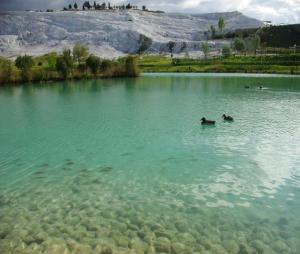Ezekiel 48:35: The Lord is Here – Part II
Easter Saturday, April 15, 2023
We know that when the prophet Ezekiel was deported, he was taken to a small village on a canal near the banks of the river Chebar. Scholars believe that around the year 597 B.C.E. he trekked with others from Israel to Syria, then south through modern Iraq. He may even have volunteered to accompany an early wave of deportees before the collapse of Israel in 593 B.C.E. In any case, he was called by the Spirit to speak, and to write down the oracles sent to him. And he obeyed. An essay in the CATHOLIC STUDY BIBLE tells us that despite the fact that he uses the pronoun “I” so frequently, he “showed little initiative and remained completely obedient to God, like clay in the hands of the potter. He never questioned God’s complete control”. (Senior RG 337-338)
Ezekiel was a strong influence in his community and kept before the exiled the central importance of the temple and the presence of the Lord – even though the temple had been defiled, and the faithful could no longer visit its sacred precincts. It is likely that through priests like Ezekiel, the Jewish community was able to cling to Yahweh through the excruciating trial of separation, and so we can look to him as an exemplar of how to best live when we are physically separated from something we hold dear. We must allow the healing waters of the Spirit to flow through our temple – because the Lord is Here. He is in the suffering, he is in the healing, and he is in the rejoicing.
When we are faced with deep disappointment or separation from all we love, how do we respond? Today we consider this question as we remember that God is especially with us when we suffer.
From the CATHOLIC STUDY BIBLE (NAB) Readers’ Guide page 337: The last chapters of Ezekiel describe the new temple in the New Jerusalem and the description “offers a vision of fresh water, flowing from the altar, down the Kidron Valley, into the Dead Sea. It is part of a biblical tradition, symbolically declaring that all life flows from God, enthroned at the Temple . . . The long passage in Sirach 24 transforms this stream into the four rivers of paradise, awaiting the wise person and true worshipper. The Temple accordingly becomes a symbol of the messianic era and mirrors God’s true and everlasting home in heaven. . . The passage from Ezekiel, especially its opening words [in 47:1-12], has inspired the ancient paschal hymn, in Latin Vidi aquam, ‘I saw water.’ Water became an important feature in the Easter liturgy. The Book of Ezekiel ends fittingly with the new name for Jerusalem, ‘The Lord is here’.”
When we spend time with this prophecy today, we have the opportunity to feel the presence of God as we remember and reflect . . . we are Easter People . . . cleansed by Easter water . . . and the Lord is among us.
Senior, Donald, ed. THE CATHOLIC STUDY BIBLE. New York, Oxford University Press, 1990.RG 337. Print.
Images from: http://www.biblicalarchaeology.org/exhibits-events/tablets-of-jewish-exiles/ and http://www.richardlydiard.com/achives/chebar_river.html
Adapted from a Favorite written on September 15, 2007.
For more on the Babylonian exile of the Israelites, visit the Encyclopedia Britannica at: http://www.britannica.com/event/Babylonian-Exile







![david repent[1]](https://thenoontimes.files.wordpress.com/2013/11/david-repent1.jpg?w=500)
